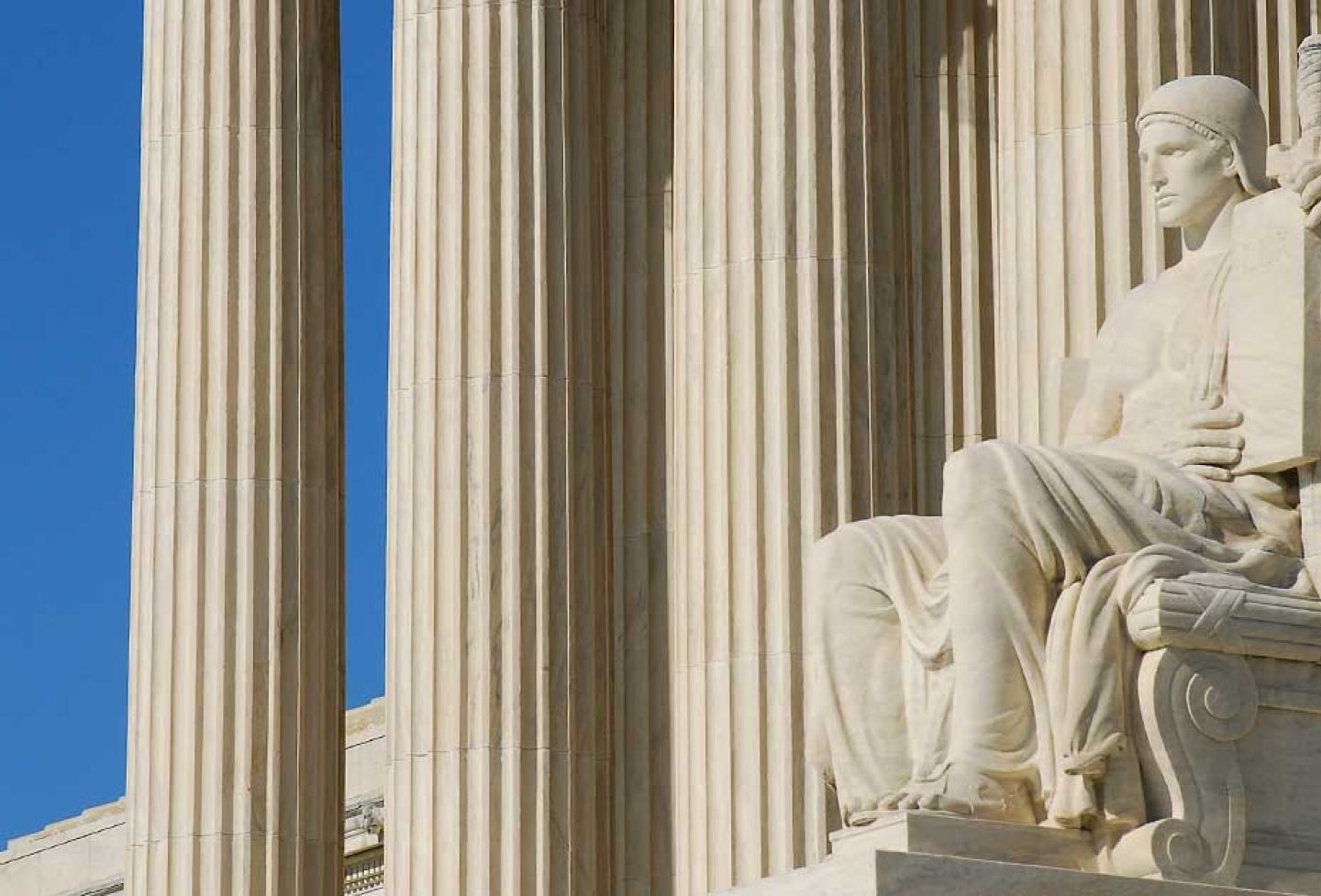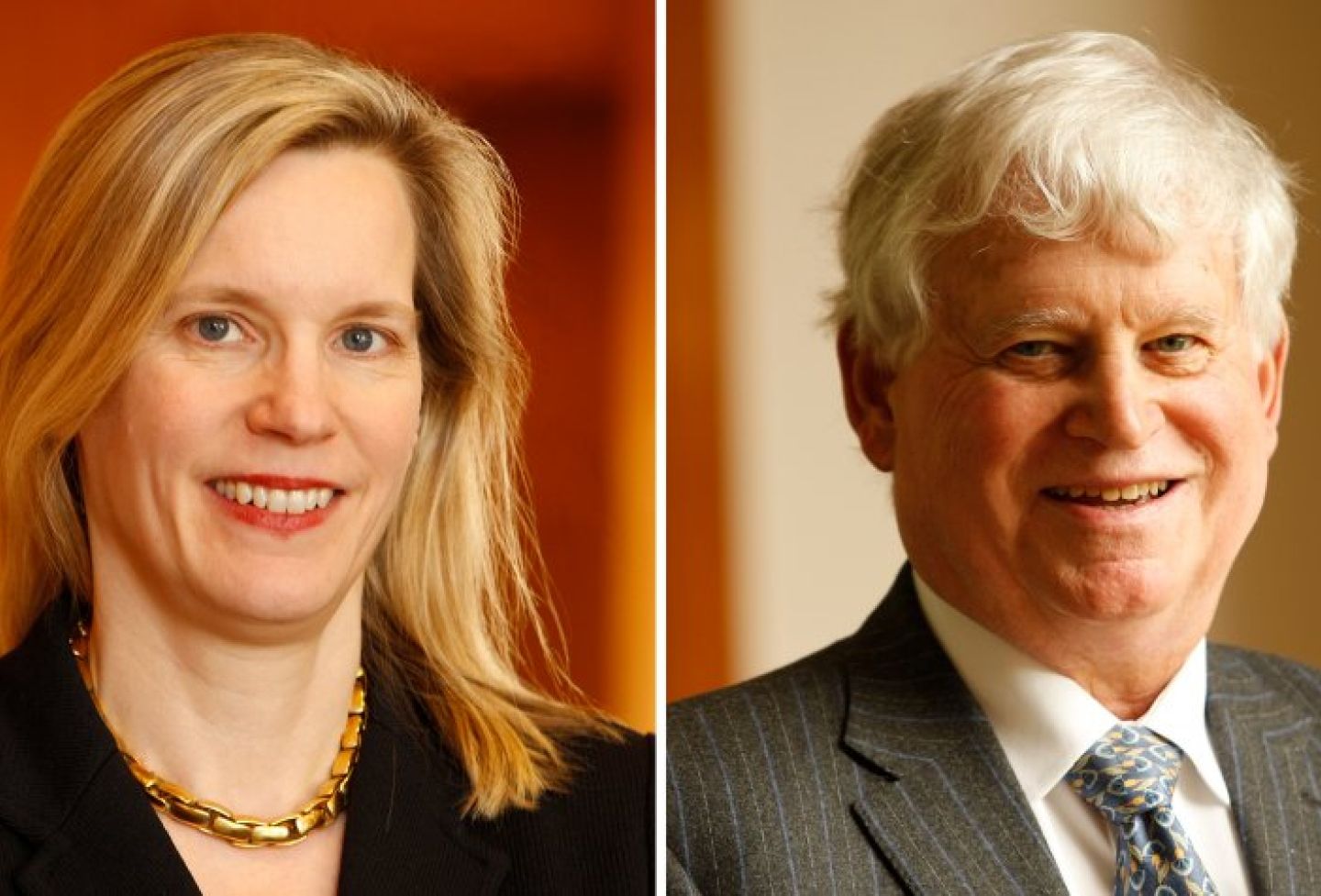Send Us Your News
To submit a class note, email us or submit mail to UVA Lawyer, University of Virginia School of Law, 580 Massie Road, Charlottesville, VA 22903. Please send your submissions no later than Feb. 1 for inclusion in the next issue.
1948
Leonard Lambert Rivkin, founding partner of Rivkin Rader, died peacefully in his sleep, surrounded by family, on July 10, at the age of 95.
Rivkin founded the firm that bears his name in 1950. He served as national trial counsel in high-profile, and precedent-setting cases, including the representation of a major insurer in the Franklin National Bank crash, one of the largest bank failures in American history. He represented insurers’ interests in some of the most challenging environmental-related insurance coverage litigations across the United States, including involvement in the cases made famous by the films “Erin Brockovich” and “Legal Action.” In 1978, the first Agent Orange case was filed. Rivkin served as lead counsel for Dow Chemical on the class-action suits that thrust the firm into the national spotlight. Rivkin’s memoir, “May It Please the Court,” was published by Carolina Academic Press in 2000, chronicling his professional life.
Rivkin grew up in Far Rockaway, N.Y., and attended UVA, where after one semester he enlisted in the U.S. Army during World War II. A year later, he returned with a Silver Star and two Purple Hearts. He returned to UVA and completed his undergraduate studies and law school in three years.
An avid boater, Rivkin was a member of the governing board of the New York State Maritime Academy and published articles on cruising. Rivkin was married to Lenore (deceased) for 34 years, and they raised two children: Janet Zuckerman and John Rivkin ’81, a retired partner of the firm. He thereafter was married to Betty (deceased) for 28 years.
1951
James Edwin Coleman Jr. died Feb. 22 in Dallas, at age 96.
Coleman was in the first grade in Atlanta when the stock market crashed in 1929. His family was forced to move in with his grandparents. At the age of 6 he had his first job as a “runner” at the local pharmacy, delivering prescriptions and other items to people’s cars at the curb. He attended public schools in Atlanta and was active in sports.
Coleman enrolled as an engineering student at Georgia Tech on a football scholarship and, while in college, met the love of his life, Margaret Sutherland. He enlisted in the Army soon after the attack on Pearl Harbor. He served as a platoon leader and first lieutenant and fought through Europe with Patton’s 3rd Army; involved in heavy combat, he received the Silver Star. At the end of the war, he was transferred to Texas, where he served until release from duty in 1946. Upon discharge, Coleman went back to Georgia Tech to finish college, and marry Margaret.
The couple attended UVA, where Coleman received his law degree, only to be called back into service due to the Korean War. He served in the CIA from 1951-53. According to his family, he never spoke a word about this service. In 1953, Coleman and Margaret moved to Dallas, where Coleman started practicing law. He soon discovered that he loved trial work.
In 1970 he founded Carrington Coleman Sloman and Blumenthal, a boutique litigation firm. Over his career, he won numerous awards for professionalism, integrity, community service and justice, including being voted the most respected lawyer in Dallas by his peers. In 1996 he received the first-ever American Inns of Court Circuit Professionalism Award, for any circuit, before an audience including three U.S. Supreme Court justices and hundreds of lawyers and judges. He was awarded the Trial Lawyer Award by the Dallas Bar Association in 1997. In 2002 he received the Samuel E. Gates Litigation Award from the American College of Trial Lawyers, which honors a lawyer or judge who has made a significant contribution to the improvement of the litigation process. In 2005 he received the Equal Justice Award for serving the legal needs of the poor with distinction. He was the recipient of the Luther H. Soules III Award for Excellence in Litigation in 2008, for his exemplary service and career that improved the legal profession. In 2013, the Texas Fellows of the American College of Trial Lawyers awarded him the Joe H. Reynolds Award for his extraordinary achievement and demonstrated excellence in trial advocacy and for making a positive impact on the community and society. In 2014 he received the Morris Harrell Professionalism Award. In 2015, the Center for International and American Law recognized him for his achievement in the Pursuit of Justice for All. Lastly, he was inducted as a Texas Legal Legend by the State Bar of Texas.
Coleman was heavily involved in integrating women into the profession in Dallas in the 1970s. Coleman loved nature and was connected to multiple environmental organizations. He also established the William A. Sutherland Scholarship at the Law School to honor his father-in-law and promote the legal profession.
Coleman was preceded in death by his beloved wife of 65 years, Margaret. He is survived by their three children and their families.
1952
In Memoriam: Leonard Braman ’52, D.C. Superior Court Judge
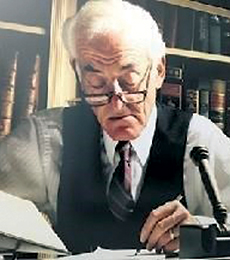
Judge Leonard Braman ’52, who served for 45 years as a trial judge on the Superior Court for the District of Columbia, died June 1, succumbing to Parkinson’s disease. He was 94.
According to colleagues, Braman was revered by the judges he served with and the lawyers who appeared before him, and also cherished by his clerks, most of whom came from the Law School. They admired the breadth and depth of his intellect, the thoroughness of his preparation, the thoughtful and insightful guidance he was able and willing to provide, and, most significantly, the diligence with which he pursued his lifelong commitment to the law as a vehicle for making justice a reality within his community. A native of Philadelphia and the elder son of immigrant parents, he came to the Law School after serving as a navigator/ bombardier in World War II and then obtaining his undergraduate degree from Temple University. At the Law School, he was a Virginia Law Review editor and a member of the Order of the Coif. Following graduation in 1952, Braman spent a year as law clerk for Chief Judge E. Barrett Prettyman of the U.S. Court of Appeals for the District of Columbia Circuit. After serving a year as an assistant U.S. attorney for the District of Columbia, he received a prestigious Bigelow Teaching Fellowship at the University of Chicago Law School, and considered a career in academia.
But before committing himself to teaching, Braman decided to see what private practice was like, and he accepted an offer to join the firm Newmyer & Bress, where, as he later told Steven Tabackman ’76, one of his law clerks, he “got bit by the trial bug, and never looked back.” Several years later, the firm became Bress, Braman, and Hilmer, where he practiced until 1965. When President Lyndon Johnson appointed Bress as U.S. attorney for the District of Columbia, Braman became the head of litigation at the law firm Surrey, Karasik, Greene, and Hill until his appointment to the bench in 1970.
Mark Levinstein (Col ’79), a Williams & Connolly partner and adjunct instructor at the Law School, met Braman in 1991. Braman’s brother Norman owned the Philadelphia Eagles and retained Williams & Connolly, but insisted that his brother review proposed briefs. Levinstein said Williams & Connolly partners who litigated complex cases before Braman recognized his exceptional intelligence and skill as a trial judge, as well as his empathy.
Braman was appointed to the new Superior Court bench in 1970 as part of D.C. Home Rule, and quickly made his mark as a judge who worked extraordinarily long hours to prepare himself to address the issues presented to him. During his first year on the court he issued an opinion that traced centuries of English common law to hold that tenants had a Seventh Amendment right to a jury trial in eviction proceedings. Subsequently, a unanimous Supreme Court, in an opinion by Justice Thurgood Marshall that drew heavily from Braman’s, affirmed his analysis and reversed a decision by the D.C. Court of Appeals which, despite its reference to “Judge Braman’s scholarly opinion,” had reached the opposite result.
Thomas Guidoboni ’71, who joined D.C.’s Public Defender Service following his clerkship, pointed out that Braman also broke new ground in criminal procedure. To ensure that the defense could more effectively cross-examine police witnesses who typically would testify at pretrial suppression hearings as to what civilian witnesses observed, Braman required the prosecution to give the defense statements containing information that the police received from those witnesses.
Ronald Stevens ’72, who sought a clerkship with Braman on the recommendation of former Law School Dean Richard Merrill, recalled another of Braman’s precedent-setting rulings that defendants were entitled to the prosecution’s witness list in discovery. Both of these practices were novel at the time but came to be widely adopted in the Superior Court.
Guidoboni and Stevens each recalled that Braman dispatched them to the Library of Congress to research centuries-old English common law that provided the underpinning for Braman’s analysis in those cases. Stevens emphasized that this kind of thoroughness and the resulting decisions were emblematic of Braman’s approach to the law: “Judge Braman would quote the words carved on the front of Clark Hall, the old Law School building [which are on the current building as well]: ‘That those alone may be servants of the law who labor with learning, courage, and devotion to preserve liberty and promote justice.’ But he always emphasized that judges must remember that their decisions impact people’s lives, and that laws must be interpreted and applied to achieve just results. Justice was his calling.”
Braman’s most highly publicized case on the bench was the Hanafi Muslim murder case in 1974, in which a group of Black Muslims from Philadelphia came to D.C. and murdered seven family members of the leader of the Hanafi Sect in their home, which had been purchased for them by NBA star Kareem Abdul-Jabar. Stuart Pape ’73, currently the head of the Food and Drug Administration practice at the Polsinelli firm and former managing partner at Patton Boggs, and who, like Stevens, interviewed with Braman at the insistence of Merrill, was Braman’s law clerk during the first of several trials in the case. Pape pointed out that the heinousness of the conduct and the notoriety that followed presented the Superior Court with jury selection problems it had never before confronted; Braman developed voir dire procedures that became the model for highly publicized cases in federal as well as local D.C. courts. Although litigation won out over academia as the focal point of his professional life, Braman never lost the desire to teach, and he was revered as a mentor, not just by his law clerks but by the younger judges on the Superior Court bench and many young lawyers. His clerks pointed out that he taught by example as well as directly.
Tabackman noted, “Watching Judge Braman prepare for and conduct trials and manage his courtroom provided invaluable lessons for any lawyer, but particularly for someone who wanted to be a successful trial lawyer, which was surely my aspiration.” Braman’s colleagues on the bench — particularly those who were substantially junior to him — also regularly looked to him for guidance, according to Superior Court Judge Russell Canan, who spoke at his memorial service.
Braman is survived by his wife, Dorothy, two sons (David and Barrett), several grandchildren, and a great-granddaughter.
—Contributed by Steven Tabackman ’76
1956
Ernest “Ernie” E. Monrad died in his sleep June 27 at 90 years old. For over 60 years, Monrad was a fixture in the Boston business community.
After graduating from Choate in 1947, he entered Harvard College, where he was a member of the Lampoon, president of the Fox Club, board member of the Hasty Pudding Club and manager of the Harvard baseball team. After graduating, he married Elizabeth “Betty” Haffenreffer, after which he spent two years in military service, and then earned a law degree at UVA.
In 1960, Monrad joined one of the nation’s first high-yield mutual funds, Northeast Investors Trust. Under his leadership as its chairman, Northeast grew from a very small fund to an asset management group with more than $3 billion under management. Tireless in dedication to his work, Monrad journeyed regularly to his office until he was 88. He also served on the boards of the Boston Five Savings Bank, Century Shares Trust, Furman Lumber and the New America High Income Fund. For over three decades, Monrad was a member of Boston’s Commercial Club.
In giving back to the field of education, particularly in Boston, Monrad established endowed chairs at Harvard in economics, Russian studies and world Christianity. He served as national chair of the John Harvard Society for 12 years and as chairman of the Harvard College Fund. Monrad was honored with the Harvard Medal of 1991 from the Harvard Alumni Association, as well as the Richard T. Flood Award in 2001 and the David T. W. McCord Award in 2011. Monrad was also past chairman of the board of Boston’s Simmons College, chairman of the board, and a trustee and chairman emeritus of the Fessenden School, among other organizations.
Monrad is survived by his devoted wife of 69 years, Betty, about whom he frequently declared, “Marrying her was the best thing I ever did.” He also leaves behind three children and their families.
1957
Duncan Charles “Chuck” Merriwether died peacefully at home in Naples, Fla., on April 24, at the age of 90. He was the beloved husband of 36 years to Lynne (Palmer) Merriwether, and father to five children.
Merriwether’s early life was spent in the suburbs of Philadelphia, where he developed a passion for piloting his own plane; duck hunting at the Swan Island Club in North Carolina with his son, John; golf; reading; crossword puzzles; world travel; and watching college and professional sports. Merriwether could recite the entire starting lineup of the players for the first professional baseball game he saw at the age of 9, between the Philadelphia Athletics and the New York Yankees, and he spent his last years celebrating the Cavaliers’ national championships in baseball, basketball and lacrosse.
A great believer in the power of education, he graduated from the St. Andrews School in Delaware, received a B.A. in English from UVA, served on the Virginia Law Review at the Law School, and was a Baker Scholar at the Harvard Business School while earning an MBA.
Merriwether was “a self-made man,” according to his family, who put himself through law school on the GI Bill, having served in the Korean War as a second lieutenant in the U.S. Army. He had a successful professional career, having won a case in the Pennsylvania Supreme Court while at the Philadelphia firm of Pepper Hamilton & Scheetz. He then went on to lead a large lease financing company in Philadelphia and later develop popular real estate communities on Hilton Head Island, S.C., and in Edwards, Colo.
Merriwether served on the national board of the Aircraft Owners and Pilots Association, the Hampshire National Bank in Hadley, and the board of trustees of Widener College. He was active in Ducks Unlimited as a life sponsor, also having created the Hilton Head Island chapter.
Retiring to Hilton Head in the 1970s, Merriwether met his wife, Lynne; they married and settled in Naples, where they were active members of the community.
1958
Class Updates by Ted Torrance, Class Secretary, @email. A message from your scribe: For a variety of reasons, all of which are unimpeachable, I have concluded that it is time for new blood to oversee the preparation of these periodic columns relating to the grand UVA Law School Class of 1958. I am delighted to report that Larry Grim has generously agreed to undertake the editorial duties, beginning with the next issue of UVA Lawyer. Those of you who have read Larry’s accountings of various class reunions know that we are in for a treat. I trust that you will be at least as responsive to Larry’s requests for information as you have been to mine.
Larry can be reached at: jlawrencegrimjr@gmail.com.
It has been a great pleasure for me to have maintained contact with so many classmates over the years, and I am especially indebted to all who have taken the time and made the effort to provide me with the information needed to flesh out these columns.
And so, to class news:
From Santa Rosa, Calif., comes an update from Jim Atkin. Jim’s wife died in 2011, and Jim suffered a stroke in 2017, prompting him to move from Roanoke, Va., to Santa Rosa later that year to be closer to his children and grandchildren.
Jim is living in an apartment community and keeps busy cooking breakfast every Friday for about 20 residents (arrangements now on temporary hold due to the coronavirus). Jim reports his sports activity is limited to assisting in the conduct of daily exercise sessions and to taking a mile walk, “all of which helps keep the old man out.” My goodness, isn’t that the goal of so many of us at this stage?
From Mendham, N.J., Stuart Brunet notes with regret the virus-caused suspension of his and Helen’s biweekly bridge games, along with the nearby Drew University’s lecture series. But not everything in the Brunet family has come to a grinding halt: Within the last year, Stu and Helen have become great-grandparents twice over. Otherwise,
Stu keeps on an even keel by attending to an ever-expanding “honey-do” list. Whatever works.
It has been my practice over the years to leave necrology matters to other sections of UVA Lawyer, but I must make an exception in the case of Art Berney, who died in March. One of his sons, Ron, wrote me a very moving letter, reporting Art’s death after a short illness and a fall, and Ron very thoughtfully sent along a link to Art’s obituary, which I will be pleased to send to any wishing to learn more of Art’s very productive life. It makes for very interesting reading.
Len Cooper has had an interesting and active life. He began his career as a litigator for municipalities and ended it as a defender of manufacturers, with extensive involvement in asbestos insulation claims. On the eleemosynary side, Len chaired the Pro Bono Committee of the District of Columbia Bar Association. For many years, Len and his wife, Vickie, followed their favorite hobby, horseback riding, and competed successfully in eventing and hunter/jumper competitions. Len turned 92 earlier this year, but he is still an avid recreational walker. More power to him!
I had a nice chat with Bill Edwards, who continues his very active litigation practice in Corpus Christi, Texas. Bill has the distinct pleasure of practicing with one of his sons, but my notes indicate that Bill’s family in general is replete with lawyers. Clearly, one doesn’t mess around with the Edwards family (unless you need a top-notch defense)!
I have long concluded that, for many lawyers, community involvement is a second calling. Such is the case with Phil Elliott. Phil began his Law School studies with the Class of 1954, but was interrupted by a stint in the Navy following Officer Candidate School, and in 1956 Phil came back to the Law School to join our class. Phil’s career included service as the first trust officer of a local bank, Daytona Beach City prosecutor, judge of Volusia County Small Claims Court, president of the Florida Association of Small Claims Judges and Magistrates, attorney for Embry-Riddle Aeronautical University, and service as a board member, since 1962, of his local Unitarian Universalist Church. Phil is a member of the 90+ Club (as are Len Cooper and, most assuredly, many other members of our class) and keeps fit by walking near his oceanfront home in Ormond Beach.
Judge Walter J. “Jerry” Ford sent along an informative note. Jerry’s letterhead indicates he is now retired as a Virginia Circuit Court judge. Jerry lost his wife to Parkinson’s disease last year, after 61 years of marriage, but in attempting to fill that void he has found much success in his participation in the Virginia Judicial Settlement Conference Program, where he has been involved in some 1,500 cases and is currently scheduling additional cases at the rate of two or three a week.
An update from Bill Griesar, always a faithful and prompt responder to my news requests: Bill and his wife, “a retired professor of art history and lover of all things French” live in White Plains, N.Y., “safe and sound and COVID-19 free.” Bill is long-since retired as a corporate practitioner in New York City, and later as vice president and general counsel at Rockefeller University for 21 years. Bill has enjoyed horology as a hobby, restoring old mechanical clocks, and has recently branched out into oil painting. “I’m hardly expert, but I am prolific, and both hobbies are good diversions in these staying-in-place days.” It is clear that Bill and his wife remain both interested and interesting people.
Michael Kaplan’s note to me was succinct: “Nothing new to report. Some moron has told me that I’m getting older. This is a malicious lie.” I pointed out to Michael that, coincidentally, the same rumor-monger seems to be at work down here in Florida.
I guess I will simply never get over the level of chutzpah exhibited by our longtime Birmingham, Ala., litigator, Hobart McWhorter. But perhaps this is a trait shared by first-class trial lawyers. Anyway, Hobart sent me a lengthy letter in part extolling his skiing skills developed while he was stationed on the northern island of Hokkaido, Japan. “I actually perfected skiing … no need to ski to the base of the mountain, remove your ski, and walk back up the hill looking for the other one.” What Hobart apparently forgot was the time when he, a native of ’Bama for Pete’s sake, took it upon himself to educate me, a native New Englander, on the fine points of skiing while on a trip to Vermont. At the end of the day, he had fallen so often that he was soaked to the skin, and nothing would do but that we turn the car thermostat to 90 while he stripped to his skivvies for our long drive home. Fortunately, the police had no occasion to stop our sauna-on-wheels.
Mina and Tom Otis have been sheltering at their home in South Dartmouth, Mass. “I play nine holes every day (weather permitting) at our Round Hill golf course … not bad for an 89-year-old geezer.” I have visited Tom and Mina in past years, and I can testify as to the beauty of their location, with great views of Buzzards Bay and the Elizabeth Islands.
As for your scribe: I may have a law degree from a fine institution, but I have concluded of late that my archenemy is the law of gravity. These days, when I drop something on the floor, a planning effort akin to that for the Normandy invasion is called for, to get that something back where I want it without seriously harming myself in the process. Anybody else have a similar problem?
Here endeth the report. We now total 54 souls as a class. Let’s keep that number as constant as may be, or Larry Grim will have nothing to do. Keep safe and well!
1960
Andrew Miller, who served as the attorney general for Virginia from 1970 to 1977, was named president of a coalition to preserve an independent Supreme Court, which is sponsoring an amendment to the U.S. Constitution to fix the number of justices at nine.
1963
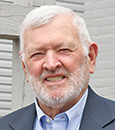
William T. Wilson was appointed to the Judicial Ethics Advisory Committee by Supreme Court of Virginia Chief Justice Donald Lemons ’76. The JEAC was established to render advisory opinions concerning the compliance of proposed future conduct with the Canons of Judicial Conduct.
Wilson resides in Alleghany County and practices mainly plaintiff’s personal injury law. He is a former member of the Virginia House of Delegates, having served from 1974 through 1989, representing Alleghany County, Botetourt County, part of Craig County and the cities of Covington and Clifton Forge. He was named a Leader in the Law by Virginia Lawyers Weekly and in 2015 he was given a Champion of Justice award by the American Board of Trial Advocates.
1964
Retired Brig. Gen. William F. Sherman, who practiced law 53 years in Little Rock, Ark., died March 11 in Nashville, Tenn. Sherman’s “anchors” were family, faith and public service, according to his family, who said he had a deep and consuming commitment to assisting others through his law practice.
Sherman’s formative years were spent in the nurturing community of Mountain Home, Ark., where his father was an engineer with the U.S. Army Corps of Engineers on the construction of the Norfork and Bull Shoals dams. Sherman graduated from the Tennessee Military Institute, and was awarded a B.A. in history from the University of Arkansas (distinguished military graduate) and an LL.B. from UVA.
Sherman had a rich and varied career as an attorney, public servant (assistant U.S. attorney, Arkansas securities commissioner, state representative, member of the State Constitutional Convention), and as a 32-year service member of the U.S. Army’s Reserve and National Guard. He served as special assistant to the judge advocate general of the Army, holding the rank of brigadier general from 1987 until 1990.
Sherman was also a tireless public advocate for individuals with cognitive and developmental disabilities, including his son, John. With his wife, Carole, he was greatly influenced and informed by John, who from birth has lived with profound cognitive disabilities. During his career, Sherman worked with parents and guardians to protect the homes and services for people with cognitive and developmental disabilities in Arkansas and throughout the country.
In 2017, Sherman closed his law office after 53 years of practice. He was honored and recognized in each of his careers. In 1990, following his services as assistant to the judge advocate general, Sherman received the Legion of Merit award. In 1991, the National Association of Superintendents of Public Facilities for Persons with Cognitive and Developmental Disabilities awarded him its Humanitarian Award, noting that Sherman “through untiring effort and tenacity challenged in court and reversed the trend of the past 20 years to close institutions through class action litigation.” He also received the Winthrop Rockefeller Memorial Award in 1970.
Sherman is survived by his wife of 52 years, Carole Lynn Williams, and their three children and family members.
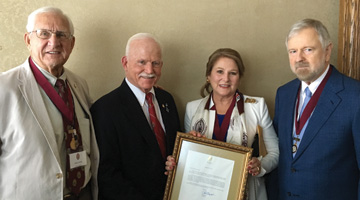
In October 2019, Lemuel Augustus “Gus” Smith completed a two-year term as governor of the 103-member First Mississippi Company of the Jamestowne Society.
Celebrations commemorating the 400th anniversary of the first session of the colony’s General Assembly took place at Kingsmill Resort and Jamestowne Island in July 2019. A reenactment by professional actors of the first session of the General Assembly, which had met July 30 through Aug. 4, 1619, also took place.
During Smith’s term, archaeologist Dr. William M. Kelso came to Mississippi and presented a program to First Mississippi Co. on his work at Jamestowne Island, and President Trump spoke at Jamestowne Island on July 30, 2019.
1969
William Franklin Drew Jr. died Feb. 21, at the age of 75. Born in Anderson, S.C., in 1944, Drew attended local public schools until 1960, when he began attending McCallie School in Chattanooga, Tenn., from which he graduated in 1962. He attended Duke University, earning his A.B. in 1966 with distinction in economics. Upon graduation he attended the Law School, where he became a member of the Order of the Coif.
While at Duke, Drew fell in love with Charlotte “Sharli” Crenshaw, a native of Westminster, S.C., who was attending the University of South Carolina. They married in 1968, and celebrated their 52nd wedding anniversary Feb. 4, just a few weeks before he died. Through their years together they enjoyed traveling and fun adventures. Drew is survived by his wife, their two children and their families.
Drew practiced law in Charlotte, N.C., with the Kennedy Covington Lobdell and Hickman (now K&L Gates) law firm until his retirement in 2002. Drew was a founding member of the North Carolina Bar Association’s Estate Planning and Fiduciary Law Section, and served actively on its subcommittees for over 25 years, participating in the drafting of many important North Carolina laws. He was a fellow in the American College of Trust and Estates Counsel and listed in the Best Lawyers in America in the areas of trusts and estates and employee benefits from the publication’s beginning until his retirement.
During his career in Charlotte, Drew was interested in civic and charitable activities, serving at various times as an officer and director of many important organizations in the Charlotte community, which included his favorite, the Foundation for the Carolinas, to which he dedicated 13 years of active service, including 10 years as director, four years as an executive committee member and 13 years as a member and sometimes chair of its distribution committee. Following his retirement, Drew continued his volunteer service in the North Myrtle Beach, S.C., area. Most notably, he worked with the S.C. Department of Archives to establish historical markers for three Myrtle Beach area outdoor pavilions; served as a director on the Waccamaw Community Foundation, and as an officer and member of the executive board of the Beach Shaggers National Hall of Fame; and assisted in the formation and representation of a number of nonprofit shag clubs and shag-related organizations.
Drew began playing golf at the age of 11, a game he enjoyed until he was physically unable to play. Since his teens, Ocean Drive and shag dancing were important parts of his life; in fact, he met Sharli dancing at Sonny’s Pavilion in June 1964. Walking on the beach Labor Day weekend 1980, he and Sharli happened upon a shag contest, and from that moment shag dancing became a competitive sport for them for the next 20 years. During this time, they routinely entered contests all over the Southeast, received a lot of instruction and met an entirely new family of friends. Among their greatest honors were being inducted into the Beach Shaggers National Hall of Fame, the Virginia Beach National Living Legends and the Sand Flea Living Legends. He and Sharli continued to dance socially and attend shag events for the rest of his life.
Edwin Sherman Villmoare III, a native of Washington, D.C., died in Fairfield, Calif., on March 11. Villmoare graduated from St. Albans School in Washington, D.C., in 1959 and Harvard College, where he received a B.A. cum laude in English literature, in 1963. He earned an M.A. in English literature from UVA in 1966 as well as a J.D. in 1969. Subsequently he was admitted to the practice of law in Washington, D.C.; Maryland and California.
Villmoare dedicated his 45-year legal career to providing legal services to the poor and disadvantaged, and to those whose civil and human rights had been violated. To this end, he created and directed legal services programs for the Office of Economic Opportunity in both Washington, D.C., and California, and directed the National Paralegal Institute in Washington and San Francisco. From 1983-2005, at McGeorge School of Law in Sacramento, Villmoare obtained legislative funding for and directed legal services programs for victims of crime and for persons with disabilities. He served as chief administrative hearing officer for the state of California.
In 2000, shortly after the war in Kosovo ended, his concern for victims of that war led him to accept a pro bono position as a senior rule of law liaison for the American Bar Association’s Central and Eastern European Law Initiative. He and his wife, Paula Bowlin Huntley, lived and worked in Kosovo for nine months, where Villmoare joined the international effort to re-create a legal system for the nation. He drafted and reviewed legislation and directed training programs for judges, attorneys and human rights advocates. He then taught human rights law at the American University Graduate School of Law in Yerevan, Armenia.
Villmoare shared his love of hiking on the Northern California coast and in the Canyonlands of Southeast Utah with his blended family. His passion for wilderness brought fun and adventure into their lives, his family said. Villmoare is survived by his wife, Paula Huntley, sons and stepson, and their families.

